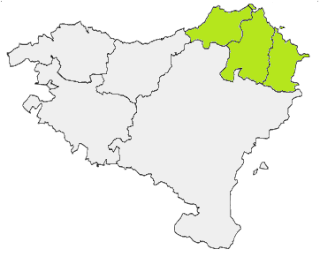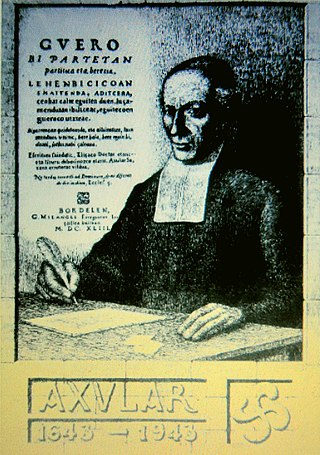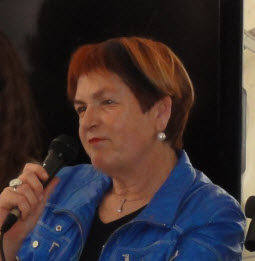
Jean-Baptiste Cavaignac was a French politician and statesman.

Galdames is a town, valley, and municipality located in the Biscay province of the autonomous community of Basque Country, Spain.
Arraia-Maeztu, is a municipality located in the province of Álava, in the Basque Country, northern Spain.

Saint-Pée-sur-Nivelle is a village and a commune in the Pyrénées-Atlantiques department in southwestern France. It is part of the traditional Basque province of Labourd.

The French Basque Country, or Northern Basque Country, is a region lying on the west of the French department of the Pyrénées-Atlantiques. Since 1 January 2017, it constitutes the Basque Municipal Community presided over by Jean-René Etchegaray.
Joan Antonio Mogel Urkiza (1745–1804) was a Basque writer of the 18th century and author of one of the most important pieces of Basque classical literature, Peru Abarka, the first novel written in that language. Finished by the author in 1782, this book was not published until 1880 — in installments that came out in a newspaper. In 1881, it was published as a book for the first time.

Pedro Agerre, best known as Axular, was one of the main Basque writers of the 17th century. His main work was Gero (Later), published in 1643, an ascetic book written with elaborate prose and composed following the traumatic period of the Basque witch trials (1609-1613).

Augustin Chaho in French or Agosti Xaho in Basque was an important Romantic Basque writer. He was born in Tardets, Soule, French Basqueland on 10 October 1811 and died in Bayonne, Labourd 23 October 1858. He is considered a precursor of left-wing Basque patriotism.

The Basque witch trials of the seventeenth century represent the last attempt at rooting out supposed witchcraft from Navarre by the Spanish Inquisition, after a series of episodes erupted during the sixteenth century following the end of military operations in the conquest of Iberian Navarre, until 1524.
Juan Pérez de Lazarraga was a Basque writer, who was born and died in Larrea, Álava. Lazarraga, member of a family of the lower nobility originating in Oñati, was the Lord of Larrea.

Although the first instances of coherent Basque phrases and sentences go as far back as the San Millán glosses of around 950, the large-scale damage done by periods of great instability and warfare, such as the clan wars of the Middle Ages, the Carlist Wars and the Spanish Civil War, led to the scarcity of written material predating the 16th century.

José Luis Álvarez Enparantza, better known by his pseudonym Txillardegi, was a Basque linguist, politician, and writer. He was born and raised in the Basque Country, and although he did not learn the Basque language until the age of 17, he later came to be considered one of the most influential figures in Basque nationalism and culture in the second half of the 20th century. He was one of the founders of ETA, but in 1967 he left because he did not agree with its political line.

Amarita is a hamlet and concejo in the municipality of Vitoria-Gasteiz, in Álava province, Basque Country, Spain. It lies along the Santa Engracia river, which empties into the Zadorra near Amarita.

Antezana or Andetxa is a hamlet and concejo located in the municipality of Vitoria-Gasteiz, in Álava province, Basque Country, Spain. It is located next to the terminal of Vitoria Airport, so it has good access via expressways.

Munain is a hamlet and concejo in the municipality of San Millán/Donemiliaga, in Álava province, Basque Country, Spain. The Basque language was probably spoken in Munain until the late 18th century, but the main language now is Spanish.

Manex Goihenetxe Etxamendi or Manex Goienetxe was a Basque historian and cultural activist.

Mariasun Landa Etxebeste is a Spanish writer. Most of her literary production has been developed in the Basque language in the field of children's and young people's literature. She is one of the writers in Basque language more translated to other languages.

Patxi Zubizarreta is a Spanish writer who writes in the Basque language (Euskara). He studied Basque philology in Vitoria, where he currently resides. He is an author of children's and youth literature, a specialty in which he has won several prizes, has also been dedicated to translation and literature for adults and has a facet as creator of shows that combine music, image and literature. He was included in the White Ravens catalog and the IBBY Honor Roll.

Bernardo Estornés Lasa, (1907–1999) was a Spanish lyrical poet and writer in the Basque language.

Idoia Estornés Zubizarreta is a Chilean-born Spanish historian and writer. She was honored with the "Premio Literario de Ensayo Euskadi" in 1988 and the Premios Euskadi de Literatura in 2014.
















